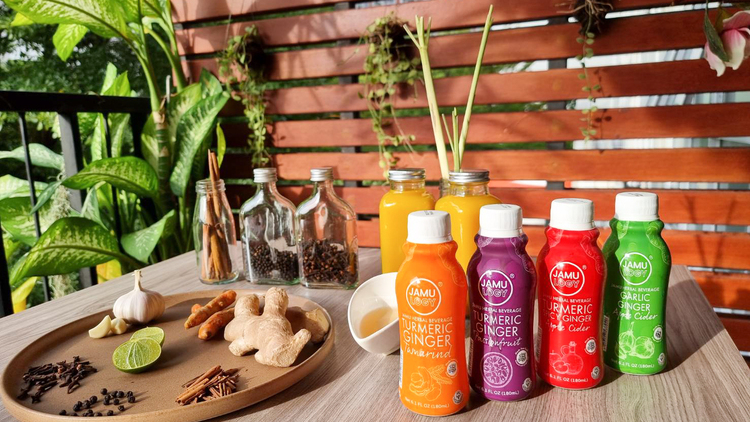Heralding from the Malay Archipelago, ‘jamu’ uses various herbs and spices native to the region, such as tamarind, turmeric, ginger, lemongrass and cloves, which are then added flavours such as passionfruit and bottled.
Now the brand Jamulogy is hoping that its innovations can suit the global consumer taste bud.
“I think it’s the right thing to start now because functional beverages are a huge trend.
“In 2022, I am trying to establish brand awareness and work with the community of jamu lovers. We’re in the early stages and need to gain more insights,” said the firm’s founder Vanessa Techapichetvanich.
With her Thai father and Siantar (near Medan, North Sumatra, Indonesia) mother, the founder moved to the Thai capital Bangkok around the year 2000.
During her growing up years, she noticed the similarities between the ingredients available in Thailand and Indonesia, especially with their identical landscapes and horticultural practices.
Consumed by men and women alike, ‘jamu’ usually have bitter, medicinal flavour profiles due to the mix of herbs and its brewing.
The Jamulogy packaging itself made no claims because Techapichetvanich said she is marketing it as food.
However, according to research unrelated to this product, the benefits of ‘jamu’ range from increasing energy, alleviating dizziness, nausea and cold symptoms, to pain relief, anti-inflammation, reducing menstrual pain and overcoming constipation.
In June 2021, Jamulogy was launched to educate consumers on the various benefits of consuming ‘jamu’ and attracting them using modernised flavours.
“We understand that ‘jamu’ is from Indonesia and South East Asia, but I want to make it well-known to the world. I want to re-imagine the traditional ‘jamu’… to ideate and innovate for different customers. I’d like to understand what the customers want, how to add value and encourage them to consume the ‘jamu’. The ‘jamu’ is not your cold-pressed juice or kombucha. It has its nutritional value,” she said.
Today, Jamulogy has grown into a start-up that supplies bottled ‘jamu’ to hotels and gourmet supermarkets in the Asia Pacific (APAC) region, such as Hong Kong, and other partners globally.
Over the past six months, it has expanded to four countries, online and offline: Singapore, Hong Kong, Australia and the US. It has also enjoyed a steady growth of 300% since early 2022.
Specifically, Singaporean, US and Australian consumers can purchase Jamulogy via Amazon.
In Thailand, the products are available in over 50 supermarkets, restaurants, hotels and health shops, and online platforms like Line, Shopee, Lazada and AOW.
“For the second half of 2022, we are also aiming for another 300% growth and achieving an annual revenue of USD$1m,” she said.
Currently, Jamulogy produces four ‘jamu’ formulations: tamarind (made from turmeric, ginger and tamarind, with a mildly sweet and sour taste and a touch of spice), passionfruit (a spin on original ‘jamu’ with passionfruit, honey and lime), apple cider (a blend of apple cider vinegar, turmeric, black pepper, ginger, lime, cinnamon and honey) and garlic ginger (a combination of spicy and tangy aromas of garlic, cloves, ginger, lime, cinnamon, apple cider vinegar and honey).
Each bottle averages around USD$4 depending on the market. It is manufactured in a plant near the Bangkok Metropolitan area, with an output of 800,000 bottles of 180 millilitres each month.
Initially, she targeted the younger generation, but the beverage’s popularity subsequently increased among the 30- to 55-year-olds in the different markets.
Jamming with ‘jamu’
According to Techapichetvanich, she and her core team of six had experimented with over 200 recipes. They took an additional seven months to learn from customer feedback on formulation and packaging after appearing in trade shows.
“It was tough in the beginning. I was scared of jamu. However, we worked with award-winning chefs and learnt about the five tastes of the human tongue. The key is to balance the flavours and nutritive values in your product,” she said.
Furthermore, Jamulogy is involved with various studies, such as investigations conducted by the autonomous research varsity Mahidol University, and has received accreditation from the US FDA, the Thai FDA, HACCP and the Thai halal certification.
With help from the researchers in herbal extraction, it managed to maintain the products’ nutritional value at around 60% during the 12-month mark after production.
Extreme care was also taken during delivery to customers at ambient temperatures, and packaging innovation was executed with suppliers from Japan.
Jumping with ‘jamu’
From June to July 2022, the firm will jump across the Pacific to focus on the US market, where it already has a distribution network.
“From our online insights and analysing customer purchasing behaviour, we forecast that the trend of consuming ‘jamu’ may kick off in the US.
“The US is a huge market, and the people are crazy about products with health benefits,” she said.
Besides penetrating the US market, Jamulogy plans to produce a powdered version of its ‘jamu’ and continue working with researchers to extract nutrients.
It will also execute various projects with local partners and be active in the accelerator programme called Space-F to be matched with investors.
Its first public fundraising started in January 2022 with a target of USD$1.5m to help establish a global network, support entry to new markets and grow the team.
“There is huge potential, and fusion ‘jamu’ is the way,” said Techapichetvanich.
